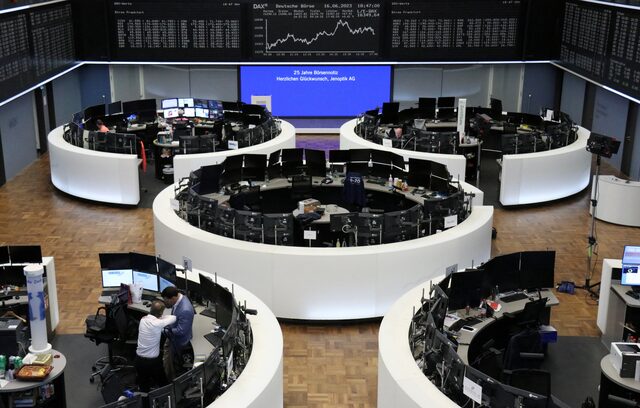European stock markets experienced a decline on Thursday as investors analyzed corporate earnings reports in light of U.S. President Donald Trump’s unpredictable trade policies, while also awaiting the European Central Bank’s (ECB) policy decision later in the day. The pan-European STOXX 600 index fell by 0.5% as of 0818 GMT, though it was still on track to end the week with a 4% gain.
Other major regional indexes, including Germany’s DAX, France’s CAC 40, Spain’s IBEX 35, and the UK’s FTSE 100, saw declines between 0.4% and 0.6%. Shares of France’s luxury brand Hermes dropped 2.2% after it reported a rare quarterly sales miss, following similar disappointing results from rival LVMH earlier this week. Spirits company Pernod Ricard saw a slight dip of 0.5% after revealing a decline in third-quarter sales, partly due to the impact of tariffs.
Analysts have lowered their earnings forecasts for European companies as the ongoing trade war, driven by President Trump’s tariffs, has darkened the global growth outlook, triggering market volatility similar to the early stages of the COVID-19 pandemic. The European benchmark index is down approximately 10% from its record closing high in March.
The ECB is expected to announce a 25-basis point rate cut at 1215 GMT to support the economy amid trade uncertainties. Investors will also be listening closely to ECB President Christine Lagarde’s press conference at 1245 GMT for clues about potential future rate cuts.
Emmanuel Cau, head of European equity strategy at Barclays, said, “It’s too early for the ECB to really go much more aggressive on the dovish stance. So we do expect cuts and a pretty balanced communication but we don’t think they will over-deliver on what the market is pricing in terms of rate cuts and guidance. The market wants to see some progress on trade deals, whether it’s China, Europe or Japan, and that will be more important than anything else.”
Meanwhile, U.S. Federal Reserve Chairman Jerome Powell acknowledged that U.S. economic growth appears to be slowing but indicated that the Fed would await further data before adjusting interest rates, contributing to a selloff on Wall Street.
Investors were also cautious about making significant moves ahead of the long weekend due to Good Friday and Easter Monday holidays.
Siemens Energy, however, saw a strong surge of 10.5% after the German energy firm raised its fiscal year outlook, following its best profit margin since being spun off from its former parent, Siemens AG.






